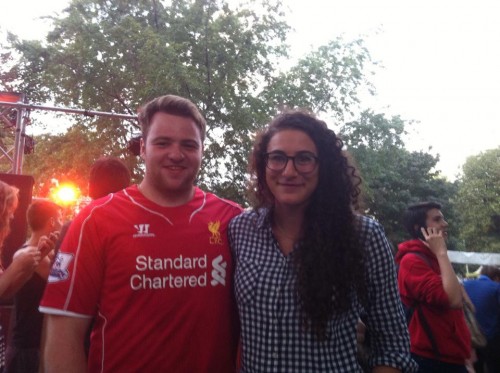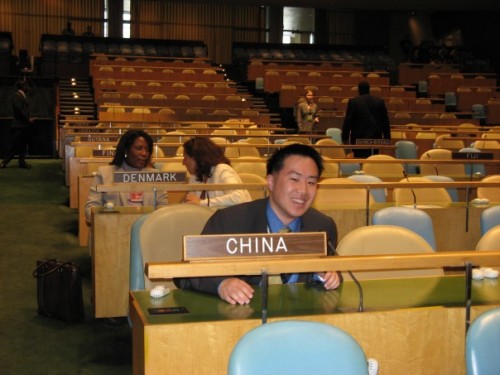College is back in session! I’m seeing a lot of my college MUN friends and Best Delegate Diplomacy Fellows recruiting new students and holding simulation tryouts for the college freshmen, and I’m also seeing a lot of high school MUN acquaintances and Best Delegate Summer Programs alumni entering college as freshmen. Given the excitement at the beginning of the year, I reflected back on my experience as a college freshman at UCLA. College is what you make of it, and everyone’s experience is different. But looking back now, here would be my ten pieces of advice for the incoming college freshmen now.
In Model UN
1. Be humble. You were probably a Model UN superstar in high school, but now there are plenty of others just like you. Your gavels and awards don’t necessarily carry weight as others will have similar accomplishments, and you will even meet bright college freshmen who never had the chance to do MUN in high school but will absolutely blow people away with their ability to pick it up quickly. A good approach is to earn respect by being humble and being open to learning like a freshman again.
2. Look for opportunities to contribute. If you’re set on Model UN being one of your primary activities and perhaps want to work your way up the leadership ranks, then look for opportunities to contribute. This could be getting involved with different events, chairing the conference, shadowing the Secretariat, finding new ways to help the club improve or grow in numbers, mentoring local schools, volunteering with UNA-USA, etc. Creating something could also be a more valuable experience than filling in a glamorous officer position. I was not selected to be the high school conference Secretary-General — the glamorous position in the club at the time — but I appreciated learning to build the travel team and college conference from scratch instead and developed entrepreneurial skills from those experiences that have since served me well.
3. Learn to research. Being a loud public speaker or making things up off your knowledge of current events won’t get you far like it may have in high school. College Model UN students tend to be well-spoken and analytical. Many of them are specializing in topics for their majors or theses. Those in the service academies or ROTC live and breathe the military. Therefore, college MUN delegates and chairs can easily tell when someone did their research and when someone is making things up (it usually looks embarrassing, actually). Research is a fundamental skill for any university student. Learn from your professors, TAs, and upperclassmen what good research looks like.
4. Learn crisis. College conferences, particularly in North America, are increasingly focusing on crisis committees. This is not just because they love crisis, but because the world is becoming much more complex where international organizations and states are not the only players who impact international relations. Crisis committees teach different skills than GA committees do, and it’s good for your MUN education to be cross-trained in both committee types. I also think this setup is good for career preparation as most entry-level jobs are structured in small teams that require rapid decision-making.
5. Practice positive-sum relationship building. The college circuit is relatively small. Zero-sum mentalities such as gavel-hunting and screwing people over will give you a bad reputation that will spread quickly since everyone knows each other. This will hurt you in the long run, not just in MUN, but perhaps in your career as many Model UN alumni enter into similar career fields. College is full of amazing people — try to get to know them.

Best Delegate Diplomacy Fellow Marta Canneri (right) with a Best Delegate Summer Programs alumnus entering as a freshman at McGill University
In College
6. You don’t have to major in political science or international relations to be successful in Model UN. Major in whatever you want and whatever interests you. MUN will give you the skills to succeed in many careers. I have Model UN friends who went on to medical school, dental school, engineering, and other fields who’ve since shared with me about how helpful MUN is to their careers. That said, MUN students tend to be attracted to certain majors such as political science, international relations, economics, and other social science fields, so it’s worth exploring them to see if that’s what you’re truly interested in.
7. Try Model UN but also join other clubs. College is a time to explore your interests. I would of course advocate that you join Model UN, but also try other activities to see if you like it or the people there. Two pieces of accompanying advice for this: 1) Remember to balance your time and don’t burn out doing too many things. 2) Find your true friends. It may or may not be in the MUN club. My best friends — the ones who invite me to weddings these days — happen to be from my second year dorm floor rather than MUN. That said, I also know MUN couples who’ve gotten married and friends who’ve been invited to weddings of MUNers they met on the college circuit.
8. Go beyond MUN. You may be wondering how you can make a real impact on the various issues that you’ve debated about in your MUN committees, and you realize the point of MUN is to do something good or study the topic in-depth rather than just talking about it in a simulation. I would recommend researching into different clubs and events on campus, research opportunities, internships, and study abroad opportunities. One of my most formative experiences was studying abroad in Shanghai — it really helped me understand the world I was studying beyond textbooks and influenced me to change my career interests.
9. Start learning about careers and the internship process. I went to career fairs, recruiting presentations, and connected with alumni mentors starting as a freshmen. I found out early through that process that I wouldn’t enjoy law, learned what it’d take to get into the State Department, and discovered companies outside of the IR field that I’d be interested in. Most companies and organizations nowadays highly prefer internship experience or recruit primarily from their interns, so it’s important to start researching what opportunities are available and how to get one.
10. Have fun. College is not high school where your classes and schedule are structured and you felt compelled to do things or compete to get into college. College should be a fun and memorable time where you make the most out of the experience that you want to get from college.
Good luck and hope to see you on the circuit this year!
**
What other advice would you give to college freshmen?



